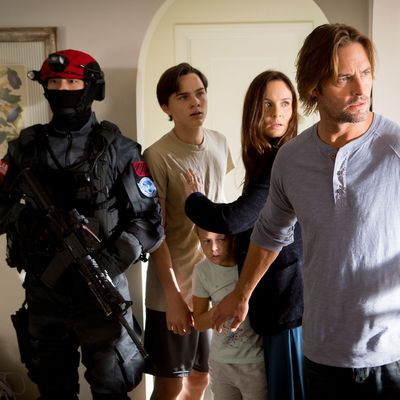
If you didnÔÇÖt know that USAÔÇÖs science-fiction drama Colony comes from one of the co-producers of Lost, the first few minutes would clue you in. WeÔÇÖre dropped in medias res into Los Angeles on what looks like an ordinary, low-stakes day, joining an upper-middle-class family that lives in the kind of house inhabited by any number of TV clans. But we soon realize that something is off. The camera lingers on a photograph of a young boy whoÔÇÖs not eating at the kitchen table with the rest of the family ÔÇö a son whoÔÇÖs revealed to have gone missing. TheyÔÇÖre known as the Sullivans, but their real names are Will and Katie Bowman (LostÔÇÖs Josh Holloway and Sarah Wayne Callies of The Walking Dead). Then Will leaves.
Why? Do you really want to know? If the answer is no, read no further; the chief pleasure of this series from Cuse and Ryan Condal is the way it slowly unveils its world, one fact at a time, without any exposition, save for the occasional clarifying statement. The posters ask, ÔÇ£Which side are you on?ÔÇØ and the TV ads and internet trailers hint that the show is about life under an occupying force, possibly extraterrestrial. But the series itself takes an unusually (by TV standards) long time disclosing┬áits particulars; once they are disclosed, you wonder if youÔÇÖre being steered toward an incorrect knee-jerk assumption thatÔÇÖll be contradicted later. (Spoilers from here on out.)
Will is leaving to look for his missing son, who disappeared when the ÔÇ£occupationÔÇØ began and is said to be somewhere in Santa Monica. Unfortunately, Santa Monica and Los Angeles proper are now separated by enormous concrete walls, and citizens canÔÇÖt travel from one area to another without approval. The occupation definitely looks like an extraterrestrial one; huge ships occasionally appear in the skies over Los Angeles, disclosing metallic, buglike probes (perhaps) that hover over riot-gear-clad human soldiers who monitor checkpoints and round up threats to the new state. Will is not what he appears to be. Neither is Kate. Maybe no one is. Apparently, the big Kahunas havenÔÇÖt arrived yet; what we see for now is an advance force thatÔÇÖs preparing the way for the final phase. The occupiers have entrusted their agenda to human intermediaries (including Peter JacobsonÔÇÖs Proxy Alan Snyder, who oversees Los Angeles). But we donÔÇÖt know what that agenda is, other than to snuff out the burgeoning resistance (which is led by a mysterious figure called Geronimo) before it can become a serious threat.
Future episodes clarify whatÔÇÖs going on, and the storytelling becomes more focused and varied, adopting the points of view of other characters and giving us fresh angles on the situation. This is all for the best, because on first glance, Colony┬álooks like yet another French ResistanceÔÇôversus-Nazis or American ColonistsÔÇôversus-Redcoats fantasy, putting 21st-century Yanks in the position of feeling like underdogs again, after 70 years of playing an international military role thatÔÇÖs usually more like that of the invaders in Colony. There are echoes of TNTÔÇÖs Falling Skies, both versions of V, and the second half of Steven SpielbergÔÇÖs War of the Worlds, but surprisingly little overt violence at first. And the somber matter-of-factness of the storytelling (note the unremarked-upon scorch marks on the sides of buildings) freshens up what might otherwise have felt like one more trip to a dried-up genre well. Kathy Baker and Carl Weathers show up, too ÔÇö though here, as elsewhere, I would rather not explain what their roles entail.
The first three episodes are directed by Juan Jos├® Campanella, an Argentine. He was nominated for a Best Foreign Language Film Oscar for 2009ÔÇÖs The Secret in Their Eyes, about the psychic aftermath of the ÔÇ£Dirty WarsÔÇØ era of that countryÔÇÖs history, with its normalized cycles of kidnapping, rape, and torture. His background might partly explain why the showÔÇÖs attitude toward life in an occupied city feels lived in rather than imagined. When our heroes are offered a chance to compromise their principles for comfort and safety, itÔÇÖs clear that they really are weighing the pros and cons, even though the outcome implies otherwise. Proxy Snyder, the showÔÇÖs most vividly unpleasant character, feels more real than most of the bureaucratic toadies you see in U.S. films and TV shows about life under dictatorship, because the show has gone to such lengths to detail how this sort of existence affects the lives of people who arenÔÇÖt tied to power. When Snyder shows up at Will and KatieÔÇÖs house one morning and starts fixing bacon and eggs for them and their kids, the moment feels genuinely invasive, not just because Snyder is flouting his power over them, but because heÔÇÖs so nonchalant and cheerful, and because the scene tells us that bacon and eggs have become luxuries available only to those with connections.
Will Colony keep building toward something truly memorable? ItÔÇÖs always hard to say when a show first starts out, and itÔÇÖs harder to guess with a show like this because of how the story is told. But however things shake out, USA should feel good about having made an investment in what seems, for the moment, like a work of real science-fiction, rather than science-fiction-flavored action or horror ÔÇö a work of ideas and real emotion, with strong performances (itÔÇÖs nice to see Holloway playing scared and overwhelmed at times) and a keen grasp of which storytelling cards to play and which to keep in reserve.


